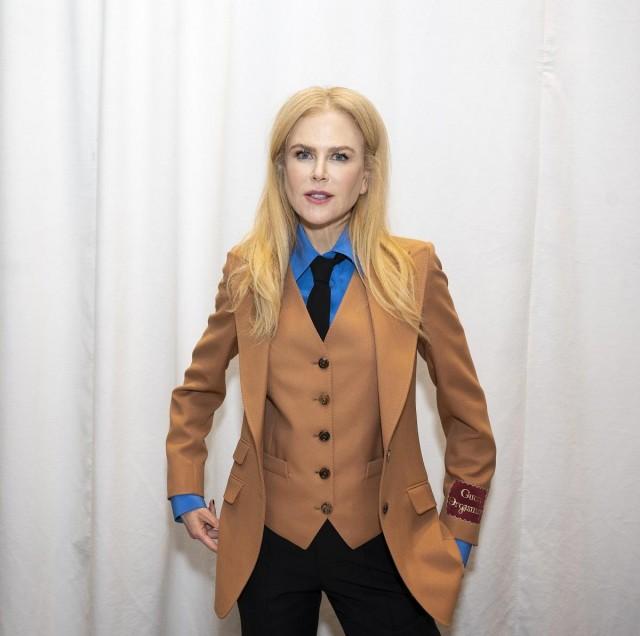Nicole Kidman, J.K. Simmons, and Aaron Sorkin on their latest collaboration, 'Being the Ricardos'
LOS ANGELES — When Cate Blanchett dropped out of "Being the Ricardos," Australian actress Nicole Kidman signed up for the coveted role as the iconic comedienne Lucille Ball. Will this be Nicole's chance for a Best Actress nod during this awards season?
The 54-year-old actress-producer is already getting critical raves for her performance.
Portraying Ball's husband Desi Arnaz in the Aaron Sorkin-written and helmed biographical drama is the talented Javier Bardem.
The film focuses on the relationship between the power couple and "I Love Lucy" stars Ball and Arnaz who in 1952 were facing a series of personal and professional crises that threaten their relationship, careers and their own TV show.
Also featured in the film are J.K. Simmons as William Frawley, Nina Arianda (Vivian Vance), Tony Hale (Jess Oppenheimer), Alia Shawkat (Madelyn Pugh), Jake Lacy (Bob Carroll, Jr.) and Clark Gregg (Howard Wenke), Nelson Franklin (Joe Strickland) and Christopher Denham (Donald Glass).
Below are excerpts from a Q & A that followed a screening of the movie at the Village East Theater in New York.
Aaron Sorkin

Once you decided to do it, when did you figure out what the structure was going to be?
Having it take place during one production week was one of the first things that I had. I really like to condense time and space. So, I had this idea of taking these three major events in her life—The Red Scare, Desi showing up on the cover of Confidential Magazine with another woman in the headline, Desi's wild night out, and Lucy being pregnant. They all happened. They just didn't happen in the same week. And put them in the same week just to put as much pressure on her as I could on all of them. When you put pressure on these characters, you can really learn about them.
How do you navigate when you're playing two people at the same time? I know Aaron that you shot those in the scenes of when you're playing Lucy, that's going to be one day and then Lucille's scenes are going to be on another day and never the two shall cross?
We have two shooting days of "I Love Lucy." Just two days out of a 41-day shoot. There actually isn't that much "I Love Lucy" in the film. A little bit goes a long way. And I should mention we're missing the fourth musketeer. Javier couldn't be here. I swear I'm going to answer your question. So, we shot the whole thing during COVID-19, and the casting period was during COVID-19 too. And so, I had a Zoom meeting with Javier. Actors know that if they're asked if they can ride a horse, the answer is always yes. And so, I said to Javier, "Hey, listen, it's not a deal breaker or anything, but have you ever held a guitar in your hand, have you ever scrubbed?" "Oh my God. I could play the guitar. I'm Jimi Hendrix on the guitar." And, "Have you ever banged a drum?" "I've got a set of drums right off over here. I can dance. I can rumba. I'll teach Nicole how to rumba." He did know how to do any of those things.
So, his process was learning how to do that stuff. But I had told all of them that I was not looking for an impersonation of Lucille Ball, of Vivian Vance, of William Frawley. That once they were playing, "I Love Lucy" characters, once they were playing Lucy Ricardo, Fred and Ethel, and Ricky, that there was going to have to be a nod toward those things. But it was two days of "I Love Lucy" shooting. On that first day, I had roped off about four hours in the morning where I thought that Nicole and I were going to be standing in front of a monitor that had playback of that, I mean we're going to shoot it by inches, shoot it three seconds at a time. And Nicole and I were going to look at playback and okay, she puts her left hand here on the mantel as she turns to Ethel. Nicole came in knowing it all already, just ready to dive into vat of grapes and roll around.
Talk about Lucille Ball as a woman and actress.
Lucille is an extremely commanding woman. She owns the piece of ground that she's standing on. She's not just the funniest person in any room that she's in. We wanted to show kind of a comedic chess master. And that's why all of the "I Love Lucy" moments, all black and white moments are happening in her head. Whether she's being picked in the writer's room, whether it's rehearsal. We go into her head, and she is seeing how this is going to look on Friday. Is that joke going to work? I'm standing in this vat of grapes. What else am I going to do? Otherwise, I'm just going to be standing in a vat of grapes, looking at the audience. And we can see how her mind works. And then the other thing that really got my interest was that it was a heartbreak that she and Desi were deeply, passionately in love with each other, and that they couldn't get it together to make it work. That each of them has that tragic flaw in them.
Did you always hear, "Lucy, I'm home" a tragic line?
I remember the moment because Lucy also had a really strong desire for domesticity. As she said, she wanted a house with a family and dinner time. And I just remember during the period, there's a long research period, and then there's a long climbing the walls period. Just pacing around, driving around. Oh my God. I have a lot of information in my head, but it doesn't get any closer to a movie. And I just thought of the line, "Lucy, I'm home" and the irony. And I basically got the same look on my face that Nicole has on her face at the end of the movie when Ricky says, "Lucy, I'm home." Just the irony struck me. And I thought, if I can turn that moment at the end.
There are moments that... two moments at the zero-stage door. You see Desi do a show. He comes out the stage door. Everybody's there while the women and the band guys are in there having a bottle of champagne, Desi, Desi, Desi, Desi. And then Lucy comes to zero and Desi and Lucy come out stage door together. Everybody goes to Lucy and asks for an autograph and Lucy just hands Desi her purse. And Javier said, "I've held that purse before." Nicole said, "So has Keith."
Talk about how you got the rights for this movie.
It's a big deal. And I take it very seriously. And I remember at some point during those 18 months, we had a lunch with Todd Black, our producer and Lucie Arnaz and I and she said, "Listen, you know, you can take the gloves off my mother. She wasn't an easy woman, and you should write that." And getting that permission... it was good.
Nicole Kidman

Tell us how you played two characters—Lucy and Lucille—which was pretty extraordinary and wildly different physically, the way you move, through your gaits, facial gestures, all of that. Was there something for you that really unlocked the characters you were researching?
I sort of had two different approaches because I had the Lucy approach in then Lucille. And so, the Lucy was very physical because I was able to watch her because she's incredibly physical. And that's what I started with. I spent a good couple months by myself just studying her physicality. When she moved and particularly her style and grace was a really good way to get in because I had to change everything about my particular way of moving. And then Aaron was very specific about wanting two different voices. He wanted a Lucy voice, and then he wanted Lucille's voice and not Lucy's voice. So, she had a much, much deeper voice than Lucy's voice. So those two things were sort of my outside work. There's also inside, but that was the exterior.
Can you talk about practicing on the grapes?
Well, studying her and getting it and going around and around, I would go through and so she does all the... it's like choreography. So, it's like dance. But the one thing I didn't do was practice on real grapes. And real grapes are really slippery. So, when I got in there on the real grapes, I'm like... and then I'm like, whoa! And so that was the one thing that I hadn't predicted. But it was so much fun. And that's what I love about her is that she would find the fun in this, and she was able to, as you see in the movie, she worked it and she'd be like, do it again, and again. That really was Lucille. And there's footage. The incredible thing that I found was the footage of her directing. So later on, there was footage in documentaries and her hands and the way she would, "No, no, I want that. No." And I love how she would do this. So, the Lucy part of it was the fun part. The Lucille part was the much not fun part.
So many people see their relationship is good work complex with Lucille and Desi. I found the relationships also with Lucille and Vivian, and Lucille and Bill to be so incredibly moving. So, I want to just start with Lucille and Vivian because there's the scene in Vivian's dressing room, I thought really gutted me when I saw it. And it made me think of just how there's two women at that time and there's a toxicity, but there's also a support, and just how you navigate that. So, I was wondering if you could talk about that, and I'd love to hear the two of you.
Nina Arianda: We definitely find them in a very troubled point in their friendship. But what I loved through the journey of it is that the focus is not on the problems necessarily. It's more of these two friends who really want to resolve them. And they want to be seen in their own way. And obviously that only happens if you come from a place of love and you cherish the other person.
Nicole Kidman: The thing that's interesting is that they were really close, really good friends, but Lucille was also a producer and she had to make a show. And so that required tough choices at times. So as much as she would like to say, "Yeah, I want you to wear that dress, look amazing, as your friend, but as the producer of the show what we've got to give 60 million people, I have to deliver the show." And so that's what I think is really interesting that I wrote because finding that and her having to be a boss and choosing, do I now be a best friend, or do I be the boss? And it's complicated, just as the relationship with Jesse is complicated, just as the whole film was complicated.
I want to ask you about some of Lucille's take downs because you watch them and it's like the temperature of your blood drops by 30 degrees, because of the particular way that she can just take someone down, like the director of the episode.
There's amazing dialogue in this film. But what's great is that it's all so layered. So, when you say she's taking someone down, there's a reason she's doing these things. She's smart. She's really, really good at what she does. So, she's like just listen to me. And I think what's interesting is comedy is hard, and she shows that it's so detailed and you've got to do it again. Good is not going to be good enough. And it's why the shows last now. And you can see it. And I love watching them. Because I think, and I don't know for sure, but she was the smartest woman in the room. And so being the smartest woman in the room is hard. And she's like, "Sorry, I'm right." You know?
And I think that's what's really beautiful is that Desi was bringing a business, and Lucille's daughter, Lucie told me that her mom is really doing business. That's why when they broke up, Desi took care of all of that, and that was fantastic because she could do creative. And that's why the scenes when Aaron writes, he's more than willing to acquiesce and go, okay, no, she's like no, do this, no, have to do that. He doesn't ever step in and go, "No, I know how to do the scene better." But he does work the business side of things. So that's what I think is beautiful about their partnership is that they were having this fantastic creative partnership, business partnership, romance until he couldn't come home. And that's where it got... you know? And she loved somebody who could give her so many things but couldn't actually give her the one thing she wanted, which was him going home. That breaks my heart.
He's always like, "I'll hold your purse. Go play." He doesn't get that upset. But Desi, it was a thing for him. But he loved her. He really loved her. And Javier, and I wish he was here tonight because that was the thing we spoke about, what we were asking for them to come through us, which is what we do as an actor when we’re playing someone... But also, we wanted to have their love. That was such an important part of who they brought together. Had all the other things that end up meaning you can't stay together. But they really loved each other. And he asked when he was dying, he wanted her. I love that. It's just a lovely thing to do and giving her the center stage and giving her such pathos and richness.
Lucie Arnaz said you were genuinely her mother.
A massive relief. It was really weird standing in front of her as her mother and kind of talking to her on set. Her voice was weird and so defined and I could never get rid of it. I can hear it again now. But also, her hand gestures. She was very specific with her hands. When you watch her, she would always be using her hands. She had beautiful hands. My hands are revolting, they are. But she had gorgeous hands and when I could do it, she looked at me once and she was like, Oh! So, it's a really weird thing. She's a little older than me but I feel I'm her mom, so it's all weird.
J.K. Simmons

I wanted to ask you, if there was one specific thing that as you were researching because you're playing two different characters through the movie, which is pretty extraordinary and wildly different physically, the way you move, through your gaits, facial gestures, all of that. Was there something for you that really unlocked the characters you were researching?
I think I have less difference between me and Fred Mertz. Unfortunately for me, there's much less known about William Frawley. But I think it was the pooch. I think it was the little pooch in the belly that really was the last sort of physical touch that gave me sort of a foundation to feel a moment in Bill's body.
J.K., I wanted to ask about the scene with you and Nicole, with Bill and Lucille at the barge, which is another one that I just love so much. And tell me about how you kind of approached their dynamic and their relationship.
Well, Bill was a simple casting, a real curmudgeon. But the two real exceptions to his not being involved socially with anybody or having a relationship with anybody were Desi, and very much so Desi. They were very, very good friends. And also, to Lucille, which I think at least the research that I was able to find and certainly the scene that Aaron wrote for us was like the uncle and the voice of wisdom and experience and kindness and love, but also not holding back. I mean, he's telling her something that is not easy for her to hear. There's just everything that's on the page is there for a reason.
—MGP, GMA News




